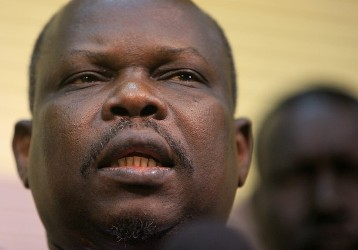S. Sudan’s lead negotiator backs Mbeki-led panel
By Julius N. Uma
May 28, 2012 (JUBA) — South Sudan’s chief negotiator at the ongoing post-independence discussions with Sudan on Monday threw his weight behind the Thabo Mbeki-led African Union High Level Implementation Panel on Sudan (AUHIP) as talks between the two nations get underway on Tuesday.

“We as South Sudan and its negotiation team will cooperate and work with President Mbeki and his team as facilitators. As you know the negotiation is between Sudan and South Sudan and if at all there is any delay in this peace process, it is because of the position taken by the government of Sudan,” Amum told journalists at Juba airport.
He accused the Khartoum regime of trying to “exploit” the people of South Sudan, describing this move as policies of the past, which he said will not succeed.
“Any threat to peace and security in South Sudan is simply because of the policy pursued by the government of Sudan,” he said, while maintaining that his government’s agenda is to create mutual understanding and cooperation between the two countries living side by side as good neighbours.
Last month, tension between the two countries heightened when South Sudan forcefully occupied the disputed of oil-rich Heglig [Panthou] region, attracting widespread condemnation from the international community, including the United Nations. There were fears the situation could escalate into a full-blown war.
The resumption of the talks, Amum said, is in accordance with the 2 May UN Security Council resolution, which required both parties to get back to the negotiating table within two weeks.
The meeting will reportedly discuss the implementation of security agreements the parties have already signed, which will also be attended by the directors of the intelligence services from both sides.
In its communiqué of 24 April, the AU Peace and Security Council (AUPSC) deplored the failure of the two parties to enforce a number of deals they signed on the administration and security of Abyei and the monitoring of border between the two countries.
The AUPSC specifically cited the “Temporary Arrangements for the Administration and Security of the Abyei Area of 20 June 2011, the Agreement on Border Security and the Joint Political and Security Mechanism (JPSM) of 29 June 2011, the Agreement on the Border Monitoring Support Mission of 30 July 2011, the decisions of the JPSM of 18 September 2011, the Memorandum of Understanding (MoU) on Non-Aggression and Cooperation of 10 February 2012.”
The African body also demanded the activation of an ad hoc committee, under the JPSM, to investigate violations of border agreements.
In its 24 April resolution the AUPSC demanded the mediation, among others, to convene a meeting of the JPSM to discuss security issues “in order to ease the current tension, facilitate the resumption of negotiations on post-secession relations and the normalization of their relations.”
VIOLATION OF UN SECURITY COUNCIL 2046
Meanwhile, South Sudan’s lead negotiator also accused Khartoum of attaching certain pre-conditions to the resumption of the talks, describing it as a “gross violation” of the UN Security Council Resolution (UNSC) 2046.
The resolution, adopted on 2 May, called on the government of Sudan to cease military hostilities against the Republic of South Sudan, including its aerial bombardment of the latter’s territory. It also called on South Sudan to stop backing Sudanese rebels.
“We call on the security council to take measures it promised in resolution 2046 and to put pressure on Sudan to comply with the resolution,” Amum said.
(ST)
